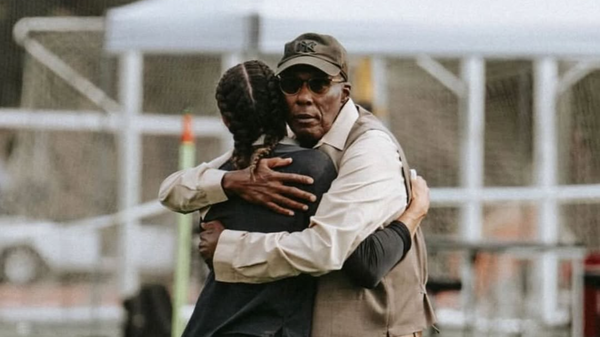
Imago
Sydney McLaughlin-Levrone (Image Source: Instagram/@ sydneymclaughlin16

Imago
Sydney McLaughlin-Levrone (Image Source: Instagram/@ sydneymclaughlin16
In a bold move to step outside her comfort zone, Sydney McLaughlin-Levrone surprised fans at the Philadelphia stop of the Grand Slam Track by entering the 100m dash, marking the first time she tackled the event in her professional career. Clocking in at 11.21 seconds, her performance was solid, if not yet spectacular. Still, it hinted at greater things to come—perhaps at the season finale of the GST circuit in Los Angeles. But those plans hit an unexpected hurdle.
Watch What’s Trending Now!
The final meet of the Grand Slam Track’s inaugural season, scheduled for June 28–29 at UCLA’s Drake Stadium, has been abruptly canceled. The reason? Reported funding issues surrounding the venue. The cancellation doesn’t just affect the GST calendar—it also rippled into USA Track & Field’s plans.
USATF had its own event slated for earlier in June at Drake Stadium but decided to pull out, citing scheduling proximity to the GST meet and a lack of feasibility in hosting two events at the same venue within three weeks. Well, the sudden collapse of the LA meet has drawn criticism from across the athletics world, including from legendary coach Bobby Kersee. Known for guiding icons like Jackie Joyner-Kersee and Allyson Felix, and currently coaching McLaughlin-Levrone, Kersee expressed his frustration in an Instagram post on June 14.
ADVERTISEMENT
“Deeply disappointed about the cancellation of the LA Grand Slam track meet,” the coach wrote. “Over four decades in this sport, I’ve watched too many promising initiatives fall short due to organizational challenges, particularly from lack of corporate sponsorship.” For a coach who has seen the sport evolve through highs and lows, the latest letdown cuts deep. And for athletes like the 25-year-old, who dared to explore new territory, it means one less stage to shine on.

ADVERTISEMENT
Bobby Kersee didn’t just express disappointment—he issued a call to action. “Our athletes are world-class. They train hard and deserve better,” he wrote, following news of the Grand Slam Track finale’s cancellation. While the veteran coach voiced his frustration, he didn’t lose faith in the tour’s potential. In fact, he doubled down on his belief in the brand, adding, “The Grand Slam brand is still very promising, but today, seasons and careers are impacted.”
ADVERTISEMENT
Determined not to let another promising venture fade into history, Kersee proposed a rallying cry to the wider track and field community. “I’m calling on athletes (past or present), coaches, athletic brands, and corporate partners to step up!” he wrote in his Instagram post. “We need leaders who will commit to sustainable investment in our sport. Our world-class athletes deserve world-class organization and commitment to match.”
As the dust settled, Grand Slam Track’s founder, Michael Johnson, also broke his silence, offering transparency and a glimmer of hope. In a video shared on the GST X-handle on June 12, the four-time Olympic gold medalist acknowledged the economic challenges that forced the cancellation but emphasized that this was not the end.
“We feel that we’ve proven everything that we needed to this year in the first three slams,” Johnson said, “and so we will go ahead now and conclude our season and focus on the 2026 season.” So while the curtain closed earlier than expected, the message from both Kersee and Johnson was clear: this isn’t a failure—it’s a reset. One that could pave the way for a stronger, more resilient future for the sport. However, for Sydney, GST brought in some unforeseen changes.
ADVERTISEMENT
Sydney McLaughlin-Levrone changed a few things for the GST
Exactly one year ago, Sydney McLaughlin-Levrone made headlines—not for a race, but for a partnership. She became the very first athlete to sign with Michael Johnson’s ambitious new venture, Grand Slam Track. At the launch event, her words carried weight: “It’s going to elevate the platforms of the athletes that compete more than once every four years… and just give opportunities for athletes to be compensated for the hard work we put in.”
For Sydney, it wasn’t just a contract—it was a commitment to reshaping the sport’s future. But for much of the two years leading up to that moment, she had been elusive on the track.
ADVERTISEMENT
After a dominant 2022 season that crowned her Olympic and world champion in the 400m hurdles, injuries began to cloud her trajectory. In 2023, a nagging knee issue forced her to withdraw from the World Championships, costing her the chance to defend her title. Then, in 2024, she made just one appearance in her signature event before heading to the U.S. Olympic Trials. Even after clinching Olympic gold, Sydney kept her appearances minimal, limited to a couple of promotional races. That’s why 2025 felt different.
Top Stories
LIV Golf Braces for Another Possible Exit in Wake of Brooks Koepka Departure

Sean Payton Announces Retirement Plans as Broncos HC Demands Improvement From Bo Nix & Co. Before Playoffs

Greg Biffle’s $4M Prized Possession Goes Up for Sale After Tragic Crash, Leaving NASCAR Fans Heartbroken

Biff Poggi All But Confirms Bryce Underwood’s Michigan Future After Announcing His Own Departure

‘Fighting for His Life’: ESPN Confirms Kirk Herbstreit’s Silent Struggles at College GameDay

Rory McIlroy Makes Feelings Clear on Bryson DeChambeau’s PGA Tour Return: ‘Have Lost…’

This season, Sydney didn’t just sign with GST—she embraced it. She promised to compete in all four of the Grand Slam meets, doubling down with an ambitious goal: eight events in total. It wasn’t just about quantity—it was about growth. For the first time in her pro career, she entered the 100m dash, diving into pure sprinting to refine her explosiveness and technique. It was a shift. A risk. A challenge. And it was inspired by what GST stood for. Grand Slam Track didn’t just offer a platform—it offered purpose. And Sydney responded by rewriting her approach to competition.
ADVERTISEMENT
ADVERTISEMENT
ADVERTISEMENT

